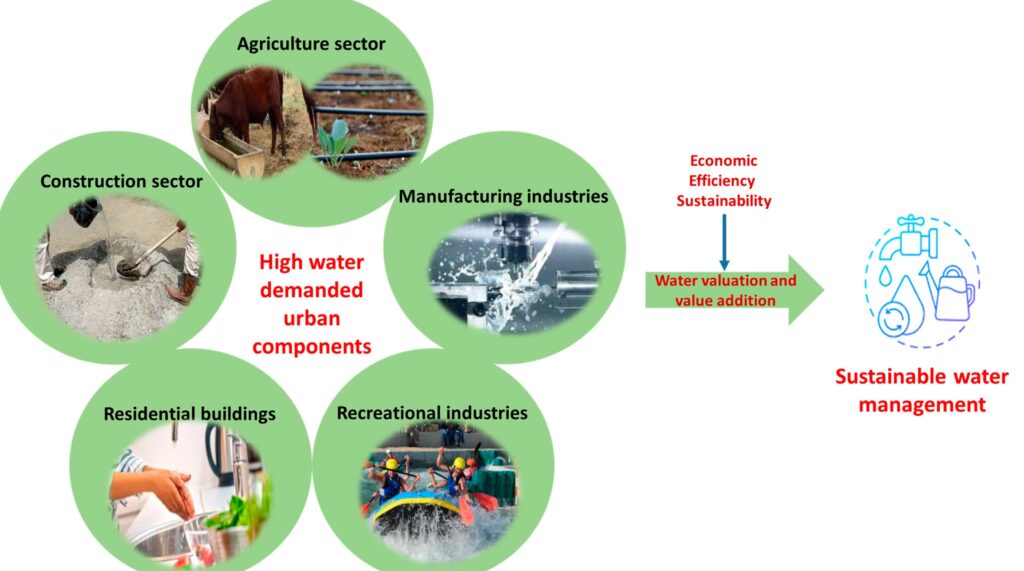
India faces significant challenges in managing its water resources due to rapid urbanization, industrialization, and population growth. A circular economy approach, which emphasizes resource efficiency, reuse, and sustainability, is essential for ensuring water security. Water storage plays a critical role in this model, helping to conserve, recycle, and optimize water usage across various sectors.
The circular economy is an innovative framework aimed at minimizing waste and maximizing resource efficiency. Unlike the traditional linear economy, which follows a “take-make-dispose” pattern, the circular economy focuses on reuse, recycling, and regenerative practices. Integrating effective water storage solutions into this system allows communities, industries, and agriculture to utilize water more sustainably while reducing dependency on freshwater sources.
How Water Storage Supports Circular Economy in India
Rainwater Harvesting for Conservation
Rainwater harvesting is a crucial water storage solution that aligns with circular economy principles. By collecting and storing rainwater, households, industries, and farms can reduce reliance on groundwater and municipal supplies. This stored rainwater is then repurposed for domestic use, irrigation, and industrial processes, ensuring efficient water utilization.
Wastewater Recycling and Storage
Industrial and municipal wastewater, when properly treated and stored, can be reused in irrigation, cooling systems, and sanitation. Advanced water treatment technologies such as reverse osmosis and bio-filtration enable wastewater to be repurposed rather than discarded. Cities like Chennai and Bengaluru have begun incorporating wastewater recycling systems to address water scarcity and promote circular water usage.
Underground Water Reservoirs for Sustainable Supply
Underground water storage solutions help conserve water while maintaining a stable and uncontaminated supply. These reservoirs store surplus water during monsoon seasons for use in dry periods, ensuring year-round availability without excessive extraction from natural sources. The use of underground tanks also reduces evaporation losses and contamination risks.
Stainless Steel and Sustainable Water Tanks
Material choice in water storage infrastructure plays an essential role in circular economy implementation. Stainless steel tanks offer a long-lasting, recyclable solution compared to plastic tanks that degrade over time. By opting for sustainable materials, businesses and communities ensure that water storage systems remain environmentally friendly and durable.
Agricultural Water Storage for Efficient Irrigation
In India, agriculture accounts for a significant portion of water consumption. Implementing water storage solutions such as farm ponds, check dams, and drip irrigation systems enhances water conservation while improving crop yield. Stored rainwater or treated wastewater can be efficiently redistributed for irrigation, reducing freshwater wastage.
Decentralized Water Storage in Urban Areas
Indian cities often experience erratic water supply due to infrastructure limitations. Decentralized water storage systems, such as rooftop tanks and community reservoirs, allow urban dwellers to store excess water for future use. This minimizes dependence on water distribution networks, ensures efficient consumption, and encourages recycling practices at the local level.
The Economic and Environmental Impact of Circular Water Storage
Integrating water storage into circular economy practices brings both environmental and economic benefits. Reduced water wastage lowers operational costs in industries and agriculture while improving resilience against droughts and water shortages. Sustainable water storage also reduces pollution, mitigates groundwater depletion, and enhances climate adaptability.
Conclusion
Water storage is a fundamental component in promoting the circular economy in India, enabling conservation, reuse, and sustainable management of water resources. From rainwater harvesting to decentralized urban storage, these solutions help minimize wastage and optimize water usage across various sectors. By embracing circular water storage practices, India can ensure long-term water security, support economic growth, and enhance environmental sustainability.


